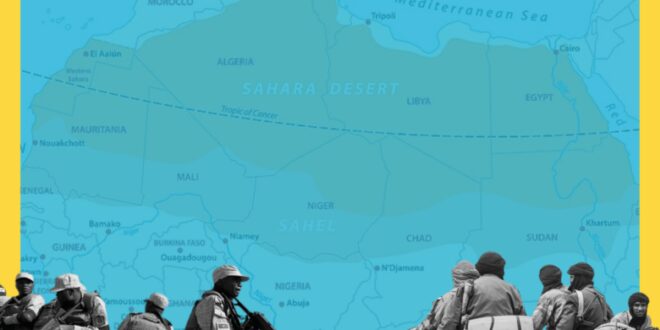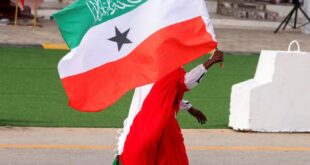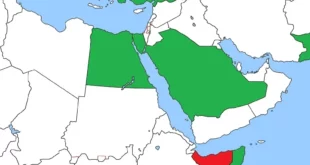The region, which includes Niger, Mali, and Burkina Faso, has been one of the most terrorised in the world for many years. The situation hasn’t improved despite recent political upheavals.
The epicentre of terrorism has relocated from the Middle East to Sub-Saharan Africa.
According to the Global Terrorism Index report of 2024, the Sahel now accounts for more than half of all terrorism-related deaths worldwide. Five of the 10 countries most affected by terrorism are in this region, with the Central Sahel being particularly hard hit and Burkina Faso experiencing a 68 per cent increase in the number of deaths over the last year.
This is consistent with the goal of Jihadists, particularly the Islamic State (ISIS), which has repeatedly called for migration to Africa, where security concerns are not adequately addressed. Certain African countries, such as Mali and Burkina Faso, have now exceeded Iraq and Syria, the birthplace of ISIS, in terms of terrorism-related deaths.
For many years, the Central Sahel region, which includes Niger, Mali, and Burkina Faso, has been one of the most terrorised in the world, harbouring terrorists such as Al-Qaeda in Islamic Maghreb (AQIM), Jama’atu Nusratil Islam Wal Muslimin (JNIM), Islamic State Sahel Province (IS-Sahel), and Jama’atu Ahlussunnah Lidda’awati Wal Jihad (JAS), who engage in various violent activities such as pillages, mass kidnappings, and suicide missions in an attempt to implement their violent interpretation of the sharia.
These terrorist organisations have also launched indiscriminate attacks on government forces and civilians alike, capitalising on the vacuum left by the collapse of international counterterrorism support and weakening regional leadership following a series of coups. These events have resulted in a large swathe of ungoverned spaces exploited by non-state actors.
The coups in Mali, Niger, and Burkina Faso have exacerbated the issue. The military rulers’ rising anti-French and anti-West sentiments have caused them to revoke security partnerships with France, the European Union, and the United States. The three countries plan to form an anti-jihadist coalition and continue working with Russian Wagner military contractors (rebranded Africa Corps) to combat terrorism in the region.
This withdrawal of the security partnership with the US by Niger and the closure of its drone base, which is crucial to counter-terrorism efforts in the Sahel, will likely aggravate the security situation. As of 2023, there were over a thousand US troops in two bases within Niger, including the drone base in Agadez, which is used to target IS-Sahel and Al-Qaeda affiliates operating within the porous borders of Central Sahel.
Since Libya’s fall in 2011, the region has seen an influx of guns, ammunition, and armed fighters. Notably, the Tuareg rebellion in Mali was reignited as a result of this influx, resulting in the loss of roughly half of the country to non-state actors. The escalating terror of Boko Haram and other violent groups has also plagued Nigeria’s border with Niger.
The humanitarian consequences are dire. The violence has claimed a shocking number of lives over the years. In 2023 alone, the Sahel region accounted for 43 per cent of total global terrorism-related deaths. According to the United Nations, around 17 million people in Burkina Faso, Mali, and Niger require humanitarian aid and protection in 2024. It also estimates that at least 3 million people are currently displaced, the majority of them being women and children.
Basic services are affected, with around 9,000 schools and 470 health facilities no longer operational. The UN said that these trends exacerbate humanitarian needs and impede people from fully exercising their human rights.
Burkina Faso: a nation in turmoil
Burkina Faso, a landlocked country in West Africa, has become emblematic of the Sahel region’s greater security issues. The country was ranked as the world’s most terrorised country in 2023, and terror-related deaths have been increasing since 2014 following the uprising that deposed President Blaise Compaoré and the subsequent coups and attempted coups.
This political upheaval created a power vacuum, which, combined with existing grievances and regional dynamics such as the 2012 Tuareg rebellion in Mali, laid the groundwork for the current crisis that has engulfed the country.
Deep-seated communal tensions, under-governed places, and security difficulties in neighbouring Mali prompted numerous armed organisations affiliated with Al-Qaeda and the Islamic State to seize territory, control economic activity, and cause political instability in Burkina Faso.
Approximately half of the country is claimed to be beyond government authority, and the two military coups in 2022 have had little effect on reducing instability. Instead, they have contributed to an increase in bloodshed as terrorists seek to grab more territory.
According to the Africa Center for Strategic Studies, the number of individuals killed by militant Islamist violence has roughly tripled since the previous coup, compared to the 18 months before Captain Ibrahim Traore took office in January 2022.
The repercussions of insecurity are severe. Thousands have been killed, and millions have been displaced, resulting in one of the world’s most rapidly expanding humanitarian disasters. Thousands of schools and health centres have been closed, and food insecurity has increased dramatically, with the UN warning of an unprecedented crisis affecting approximately 6 million people in the country.
Burkina Faso’s insecurity actors are broad, ranging from local self-defence militias to transnational jihadist groups such as Al-Qaeda’s JNIM and the IS-Sahel (previously ISGS). These organisations use local conflicts, socioeconomic differences, and the state’s limited presence in rural areas to recruit fighters and extend their power.
There have been historical tensions between communal groups such as Mossi and Peul, competition for resources between sedentary farmers and nomadic herders, and a lack of government services in rural areas. Regionally, the spillover from Mali’s crisis, as well as the abundance of armaments, have aggravated the situation. Frequent military coups and political unrest have also weakened trust in the government and its security forces.
The international community had previously responded with a mix of military assistance for counter-terrorism operations and humanitarian help. However, the withdrawal of the country from the Economic Community of West African States (ECOWAS), as well as the ending of France’s military operations in the country, are causes of concern, not only to Burkina Faso but to neighbouring West African countries such as Ghana, Cote d’Ivoire, and Senegal.
Mali’s escalating violence
Mali, the third most terror-impacted country in the world, is dealing with a complicated humanitarian situation exacerbated by growing violence. The situation has deteriorated further in 2024, with increased extremist activity and displacements.
The security situation is characterised by attacks by non-state armed groups (NSAGs) on civilians, forcing people to evacuate their homes. Although the transitional military government has said security is its primary priority and is stepping up military operations in many northern Mali towns, the reality is grim for the citizens.
According to the United Nations Office for the Coordination of Humanitarian Affairs (OCHA), 7.1 million people in Mali, or roughly one-third of the population, require humanitarian aid and protection.
As the fighting continues, the number of IDPs grows, with the International Organization for Migration (IOM) reporting almost 392,000 in Mali as of April 2023. As of November 2023, more than 100,000 people had sought safety in surrounding countries.
Women and children are among the most vulnerable, with reports of pregnant women giving birth on the side of the road due to instability that prevents safe transportation to hospitals. The healthcare system, which is already overburdened, is struggling to handle the influx of conflict-affected individuals.
Jihadist factions, such as the IS-Sahel and JNIM, continue to dominate vast areas of territory. Their tactics have changed, with sieges of cities and regions becoming more regular, hurting local economies and assistance delivery. Local officials have described these blockades as suffocating, and humanitarian agencies attempting to supply aid face considerable hurdles.
Tuareg and Arab armed groups fighting under the flag of the Permanent Strategic Framework (CSP) alliance face off against Malian forces and Wagner mercenaries in the northern regions of Gao, Kidal, and Tombouctou. Although the government offensives reawakened the rebellion in these territories, they also provided the government with victory in controlling what was previously outside its control.
The departure of the UN peacekeeping mission, MINUSMA, has aggravated the humanitarian catastrophe by creating a security and relief vacuum. The Malian authorities, led by the military administration, have been encouraged to increase efforts and collaborate closely with international partners to ensure that displaced people receive aid and essential services.
Economic hardship has increased following Mali’s withdrawal from the ECOWAS, with locals paying the price of the consequences of regional sanctions imposed after two coups in a year. The sanctions have quadrupled the cost of basic necessities like oil and sugar, significantly complicating the lives of ordinary Malians. Despite the recent easing of the sanctions, life has yet to return to normal.
The humanitarian response plan remains underfunded, with agencies receiving only approximately 30 per cent of the necessary cash. This has significantly curtailed their ability to help the 1.8 million people they have reached throughout the country.
After terrorist groups occupied northern Mali in 2012, both national and international military responses were ineffective in countering their influence. It was from there terrorism extended to nearby Burkina Faso and Niger, and it is already on the doorstep of certain countries such as Togo and Benin.
Niger: no longer at ease
Despite terror activities in the greater Central Sahel region, Niger was largely stable politically until a recent coup d’état. President Mohamed Bazoum was deposed in July 2023 by elements of his presidential guard, and Gen Abdourahmane Tchiani took over as head of state.
The coup leaders defended their actions by blaming a deteriorating security situation, with violent Islamist organisations gaining ground in the tri-border region of Mali, Niger, and Burkina Faso. However, the overthrow has only made the security situation worse. The country has been ranked the tenth most affected by terrorist activities in 2023.
The international community, especially the United States and France, saw the country as a pillar of regional stability and a counter-terrorism partner. However, Niger’s recent renunciation of military agreements with France and the U.S. indicates a shift in its approach to security and foreign relations.
Niger has faced security threats from ISWAP, JAS, and JNIM. The worsening diplomatic relations with neighbouring Nigeria, as well as the suspension of military cooperation in combating jihadist violence, has only increased the terrorists’ ability to launch assaults.
After defeating JNIM in March 2023 and gaining control of the majority of the Menaka region, IS Sahel was able to move its operational attention to Niger. Niger has since become a more frequent target of IS Sahel strikes, resulting in an increase in losses among both military and civilian populations.
In October 2023, the terrorists launched a large-scale attack on the Nigerien military target, which was considered the largest offensive on forces since the coup. The attack killed at least 29 soldiers and injured several others.
Armed conflicts continued to afflict the country’s borders with Burkina Faso, Chad, Mali, and Nigeria, especially affecting people in the Diffa, Maradi, Tillabéri, and Tahoua regions. More than 660,000 people have been displaced as a result of hostilities.
Niger is confronting a humanitarian crisis affecting about 4.3 million people, including 2.4 million children.
 Eurasia Press & News
Eurasia Press & News



